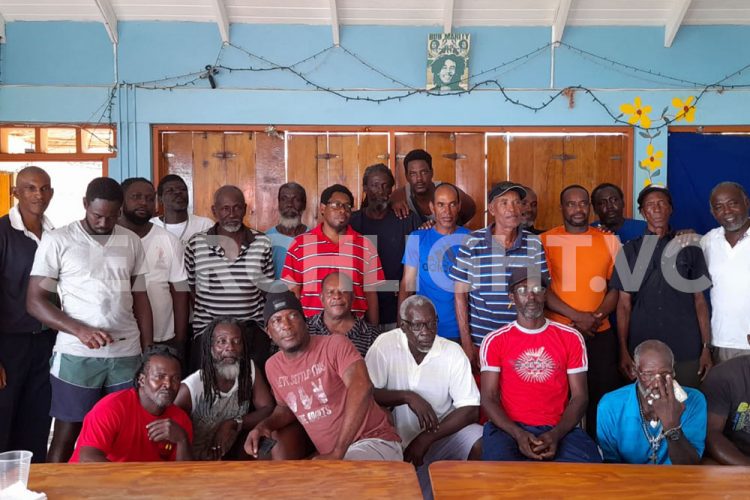Fisheries Division and FAO wrap up Safety at Sea training for Fishers in SVG

THE FOOD and Agriculture Organisation (FAO) and the Fisheries Division in the Ministry of Agriculture and Fisheries etc. teamed up to deliver a fourmonth period of training for local fishers in Safety at Sea.
Providing a background to the training, a release from the Division noted that fishing is considered as one of the most dangerous professions with fatality rates worldwide and the Caribbean is no exception. The captains and crew on small-scale vessels are often not well trained in handling their vessels safely, do not possess or carry safety gears, and lack adequate navigation and communication equipment. In addition, they are not sufficiently prepared for emergency situations at sea, and have generally limited knowledge of outboard engine repair, limited awareness of early warning and safety risk management and basic marine traffic rules or emergency first aid.
These unsafe fishing conditions and risks to fishermen’s life are compounded further by the prevalence of and destruction [caused by] natural disasters and climate change as weather events continue to increase in frequency and severity. Fishers have also indicated based on their personal experiences, that the weather is becoming increasingly unpredictable.
As a result, the FAO, under the guidance of the Fisheries Division of the Ministry of Agriculture hosted and led four training workshops in January, February, March and June for 120 fishers. The Safety at Sea training targeted over 10 different communities, two held on mainland St.Vincent, one in Bequia and one in Mayreau.The workshops consisted of classroom sessions and practical exercises at sea, and each participant received training materials and will subsequently also be given a VHF radio, life jacket and a compass to improve safety at sea.
Regional project coordinator of the Climate Change Adaptation of the Eastern Caribbean Fisheries Sector Project CC4FISH of FAO, Iris Monnereau indicated that the Global Environment Facility (GEF) funded the training. She said,“The safety of fishers is compromised in the region with great impacts of the loss of life. FAO has therefore supported improved safety of fisherfolk in the region through development of a regional safety at sea course integrating international conventions and agreements and training of approximately 1,700 fishers in the Eastern Caribbean in safety at sea”. She added, “The safety at sea trainings in St. Vincent and the Grenadines are the last trainings under the CC4FISH project.We are also grateful that we were also able to provide safety equipment and are confident we will see improved safety conditions of fisherfolk in the region”.
Officers of the St Vincent and the Grenadines Coastguard Services and the Fisheries Division conducted the Safety at Sea training.
Petit Officer, Grayson Stephens said he appreciated the opportunity to educate others in safety at sea best practices and that the fishers who took part in the workshop were very receptive. He highlighted that, “Fishers shared experiences from the past where they…encountered distress at sea because they were under-supplied or unable to transmit their locations accurately,” he said. “I am very confident that the fishers would do better in the future, having built their capacity over the course of the workshop”.
Similarly, senior fisheries assistant in the Fisheries Division, Ernie Bracken indicated that, “Safety is of paramount importance to the Fisheries Division and I’m appealing to fishers to take safety at sea seriously.”
He said in the past there [were] casualties resulting from neglect on the part of fishers in not carrying the proper equipment. However, he stressed that the fishers were very receptive of the information shared during the sessions and by all indications were willing to improve and take safety at sea more seriously in the future.
Norbet Dembar, a 63 year old fisher from Mayreau, who has been fishing since the age of 14 said: “The training was a very good thing, I loved it.” He added that as a result of the workshop he now has a better understanding of the safety at sea concepts and using the necessary equipment such as radios and compasses.
Troy Gellizeau, a 45 year old fisher from Union Island said the workshop was edifying and he enjoyed learning best practices for deploying at sea such as having adequate equipment and a good supply of water. He indicated that knowledge of the sea is never too much and he is actually looking forward to passing on the knowledge that he gained in the workshop with other fishers on Union Island.
Senior Fisheries Officer, and CC4Fish National Focal Point, Kris Isaacs stressed that he was very pleased with the roll out of the safety at sea workshops especially given increasing concerns not just regionally but globally over the direct and indirect impacts of climate change and climate variability on marine capture fisheries. He said one of the things he liked about the project is the “tangible benefits” available to fishers, such as the equipment which they can use to make their every-day activities safer.
He highlighted that, “Fisheries is a growing sector in St Vincent and the Grenadines and policies, investments, and innovations that not only look to restore the productive capacity of our oceans, but also increase the economic benefits and livelihood opportunities of our stakeholders are essential. This is especially the case when it comes to encouraging new entrants to get into the Industry.”
Isaacs reiterated that the Government of St.Vincent and the Grenadines was grateful to FAO for the provision of technical guidance, financial execution and operations over the course of the project, and he looked forward to future initiatives.









